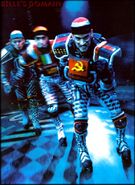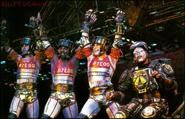The West End production, directed by Trevor Nunn and choreographed by Arlene Phillips opened on 27 March 1984 at the Apollo Victoria Theatre, where it ran for over 17 years and 7,406 performances. The theatre was overhauled to include a race track that extended into and around the stalls and around the front of the dress circle.
Original cast members included Stephanie Lawrence, Frances Ruffelle, PP Arnold, Jeff Shankley, Jeffrey Daniel and Ray Shell.
As the original production of a show with almost entirely new material, there was no template for the producers to work from in creating this production. The first few years included songs, characters and plot points not used in subsequent productions.
Creative Team[]
- Music by Andrew Lloyd Webber
- Lyrics by Richard Stilgoe
- Directed by Trevor Nunn
- Choreographed by Arlene Phillips
- Designed by John Napier
- Lighting by David Hersey
- Sound by Martin Levan
- Production Musical Director David Caddick
- Orchestrations by David Cullen and Andrew Lloyd Webber
- Produced by The Really Useful Theatre Company
Development[]
Rehearsals[]
Following a successful workshop in 1983, full-blown rehearsals for Starlight Express began in January 1984 at the ‘deliciously run-down’[1] Tropical Palace in Willesden.
Lloyd Webber recalls that on the first day, ‘Trevor Nunn gave his usual lengthy opening speech. The sight of Trevor lecturing Arlene Phillips’s body poppers about the “moral, emotional and metaphysical centre” of our railroad show was alone worth the price of admission.’[1]
Previews[]
When Starlight Express began previews, performances ran to nearly 3 hours. The creative team made many changes to the material before the production opened on 27 March 1984. One of these changes involved simplifying the character of Rusty, who had so far been a water engine, rather than a steam train – an idea that, according to actor Ray Shell was 'slowing the show down and confusing the audience'[2]. This change meant cutting an aria for Rusty called "Be a Pump", although remnants of the melody remained in the score.
Opening Night[]
Starlight Express opened at the Apollo Victoria Theatre on 27 March 1984. Lloyd Webber dedicated the material to his children, Imogen and Nicholas.[3]
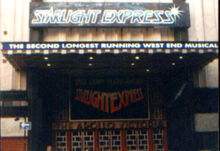
Opening Night controversy
Starlight Express’s opening night was infamous. A BBC outside-broadcast truck was parked outside the theatre, waiting to capture the response from audience members on their way out.
Fifteen minutes from the end of the show, the truck started transmitting on the same frequency as the radio microphones being used onstage. Lloyd Webber recalls that this ‘all but destroyed Stephanie Lawrence’s big number “Only He” and caused huge mirth in the finale when Lon Satton hit the lines, “There are dark days ahead when the power goes dead.”[1]
When Starlight Express’s sound designer identified the problem, the BBC refused to turn their transmitter off. Lloyd Webber theorises that the BBC sabotaged the evening, hoping to create news by capturing negative responses from the audience.[1]
The Storyline[]
The original production of Starlight Express told a fairytale story about the group of toy trains, come to life in a child's dream. The story is told in detail here.
Musical Numbers[]
See Here for full details of the song list and revisions through the run.
Revisions[]
1988 revisions[]
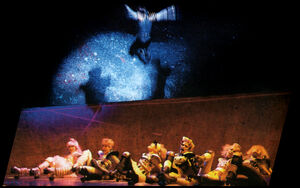
Pumping Iron, featuring 2nd and 3rd class Sleepers
Several songs were replaced or tweaked in or around 1988. This was done to incorporate revisions from the Broadway production.
- Engine of Love replaced Call Me Rusty, and appeared immediately after Rolling Stock. Following Taunting Rusty Rusty has a few lines with the melody of Call Me Rusty (This is gonna be the day), and, as with Call Me Rusty, the coaches then warn him that he is simply not tough enough to race.
- The focus of the coaches' subsequent recitative (Rusty, You Can't Be Serious) changed. As Rusty was no longer onstage, the coaches warn Pearl not to race with Rusty rather than warning Rusty not to race.
- Make up my Heart replaced He Whistled at Me, and some events were reordered. In the original version Rusty and Pearl have a discussion, then she sings her song, then Purse invites her to race with Electra. In the updated version Purse invites her to race, then Rusty and Pearl have a discussion, then Pearl soliloquises.
- There's Me had some lyrical changes. In particular, the final verse became a duet between CB and Dinah.
- Belle's Song had some lyrical changes.
- Starlight Express had some lyrical and melodic changes (becoming the version which starts "When the night is darkest" rather than "When your goodnights have been said").
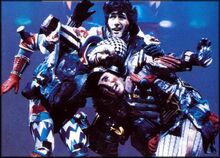
Trio version of "One Rock'n'Roll Too Many", after "No Comeback" was cut, before CB's role was cut.
- The Rap received an extra verse featuring Pearl and Bobo
- C.B.'s song had some lyrical changes. A short discussion was also added after the song between CB and Electra. Before the song Greaseball asks CB whose side he is on: in the original version he says "I'm on mine" but in the updated version he tells Greaseball "I'm on yours!" and admits to Electra after the song that he is only on his own side.
- No Comeback was cut and One Rock 'n' Roll Too Many became a trio for CB, Greaseball and Electra.
- Only He and Only You (reprise) were replaced with the duet version of Only You.
- Some recitative was cut before Light at the End of the Tunnel: Ashley and Buffy no longer reflect on finding love on the railroads, and the company no longer tell Control to "Shut it!".
1992: The New Starlight Express[]
In November 1992, the London production, christened The New Starlight Express, was relaunched with heavy revisions to the material, partly influenced by the intervening productions.
For full details, see: The New Starlight Express
1998: Ben Elton[]
In December 1998, Andrew Lloyd Webber invited Ben Elton to update Starlight's libretto (or, as Elton describes it, "put [in] a few new gags"). Elton declined, "reminding Andrew of the old adage 'If it ain’t broke don’t fix it'"[4]. Elton did, however, ask Lloyd Webber whether he would be interested in writing a new musical together. The resulting show, The Beautiful Game, opened in the West End in 2000[5].
2000: 'Starlight 2000'[]
At some point in the year 2000, the original creative team met at Andrew Lloyd Webber's house along with skate coach Michal Fraley to discuss making a further round of changes to the show[6]. Director Trevor Nunn wanted to make the races 'more violent' to keep up with changes in pop culture. This led to a wider discussion about how the material could be updated it 'for the 2000s' as it had been for the 1990s with The New Starlight Express. In the end, no changes were made to the material in London, although it would be revised heavily in 2003 for the 2nd US tour.
Cast Recordings[]
There were two cast recordings made of the London production - the 1984 Original London Cast, and the 1993 "The New Starlight Express". Both are partial show recordings, the Original Cast Recording gives a sense of the full show with some recit scenes linking the main musical numbers, however large sections of plot are seamlessly removed from the double album. The New Starlight Express recording is a one-disc highlights album, designed to be complementary to the original and provide the updated numbers rather than try to represent the whole production.
Cast[]
1984 Original Cast[]
| Rusty | Ray Shell | Pearl | Stephanie Lawrence |
| Greaseball | Jeff Shankley | Dinah | Frances Ruffelle |
| Poppa | Lon Satton | Ashley | Chrissy Wickham |
| Electra | Jeffrey Daniel | Buffy | Nancy Wood |
| Rocky 1 / Gang | Danny John Jules | Krupp / Gang | Eddie Kemp |
| Rocky 2 / Gang | Attlee Baptiste | Wrench | Carole Amphlett |
| Rocky 3 / Gang | Richard Bodkin | Purse / Gang | Kofi Missah |
| Flat-top / Gook | Paul Reeves | Joule / 2nd Class Sleeper | Debbie Wake |
| Dustin / Gang | Gary Love | Volta / 3rd Class Sleeper | Voyd |
| C.B. | Michael Staniforth | Belle | P. P. Arnold |
| Bobo / Lube | Tom Jobe | Turnov / Gang | Bobby Collins |
| Espresso | Ruel George Campbell | Hashamoto / Gang | Drue Williams |
| Weltschaft / Tank | Mark Davis | City of Milton Keynes | Raymond Hatfield |
| Cover Poppa | Abraham Osuagwu | Cover Belle | Samantha Foxx |
| Swing | Charlotte Avery | Swing | Sebastian Craig |
| Swing | Michael Seraphim | Swing | Eleanor Bertram |
| Swing | Uduak Ephraim | Swing | Pollyanna Buckingham |
Subsequent Casts 1985 - 2002[]
See Here for full cast information by year. Please note this archive is not complete and further information from the 1980s is needed.
Galleries[]
Photos of the production are divided by year.
| 1984 Gallery | Advert Gallery |
| 1985 - 1992 Gallery | 1992 - 1993 Gallery |
| 1994 Gallery | 1995 Gallery |
| 1996 Gallery | 1997 Gallery |
| 1998 Gallery | 1999 Gallery |
| 2000 Gallery | 2001 Gallery |
News[]
Articles and News[]
- 1984 - NY Times Review Round-Up
- 1985 - Reassurance for Investors in the £2 million musical Starlight Express who have complained of slow returns - Andrew Lloyd Webber predicts that now the heavy initial investment has been recouped profits will soar with a return of 40% in the next 12 months. 'We hope it will run for at least another three years and although it won't make as much as Cats it will be very profitable ' says Andrew.
- 1991 Promotion information.
- "The Wheel Thing" - Carole Waddis, 2000
- "The Race Is On" - The Funday Times, March 2000

Press Reel - London 1997
Press Pack statistics (2001)[]
- 27,600 pairs of skate laces, 27,000 skate wheels, 23,000 toe stops and 5,500 false eyelashes have been used since the show opened.
- The original London production cost £2.25m to put on, used 750 gallons of paint and varnish, six miles of timber, two and a half acres of sheet wood and 60 tonnes of steel.
- Among the most dedicated fans are the Pearson family, who allegedly watched the show every week for the last five years, and Sally Bliault, from Jersey, and Keryna Thorne-Booth who has seen over 800 performances.
- An estimated 16.5 million people have watched the show in the UK, United States, Canada, Japan, Australia, Germany and Mexico.
- More than £140m has been taken at the London box office, with a further £310m earned worldwide.
- 24 people have appeared on stage every night, with more than 200 involved in putting the show on.
- The top speed recorded by a skater was 40 mph during a rehearsal.
- In November 1992, every aspect of the production was re-worked. The show was re-directed, re-choreographed, re-lit and the set was refurbished.
Trivia[]
The london cast often took part in the tradition of "Muck Up Matinees". When the final day of the cast contract falls on a two-show day, usually a Saturday, the matinee performance is filled with pranks and practical jokes between the performers, within the restriction that these pranks must not disrupt the performance. Then the final evening show is played with sincerity and passion, the best possible performances for the last time. Common pranks include switching wigs, performers swapping tracks, turning up in the wrong place, causing other performers to improvise and not crack up laughing. Some of these pranks have been caught on camera, causing people to wonder what on earth led to three female Rockies, or combining Electra makeup with Greaseball's wig - it was the final day of that contract, and the last chance to make their colleagues laugh.
References[]
| This page uses Creative Commons Licensed content from Wikipedia (view authors). |

